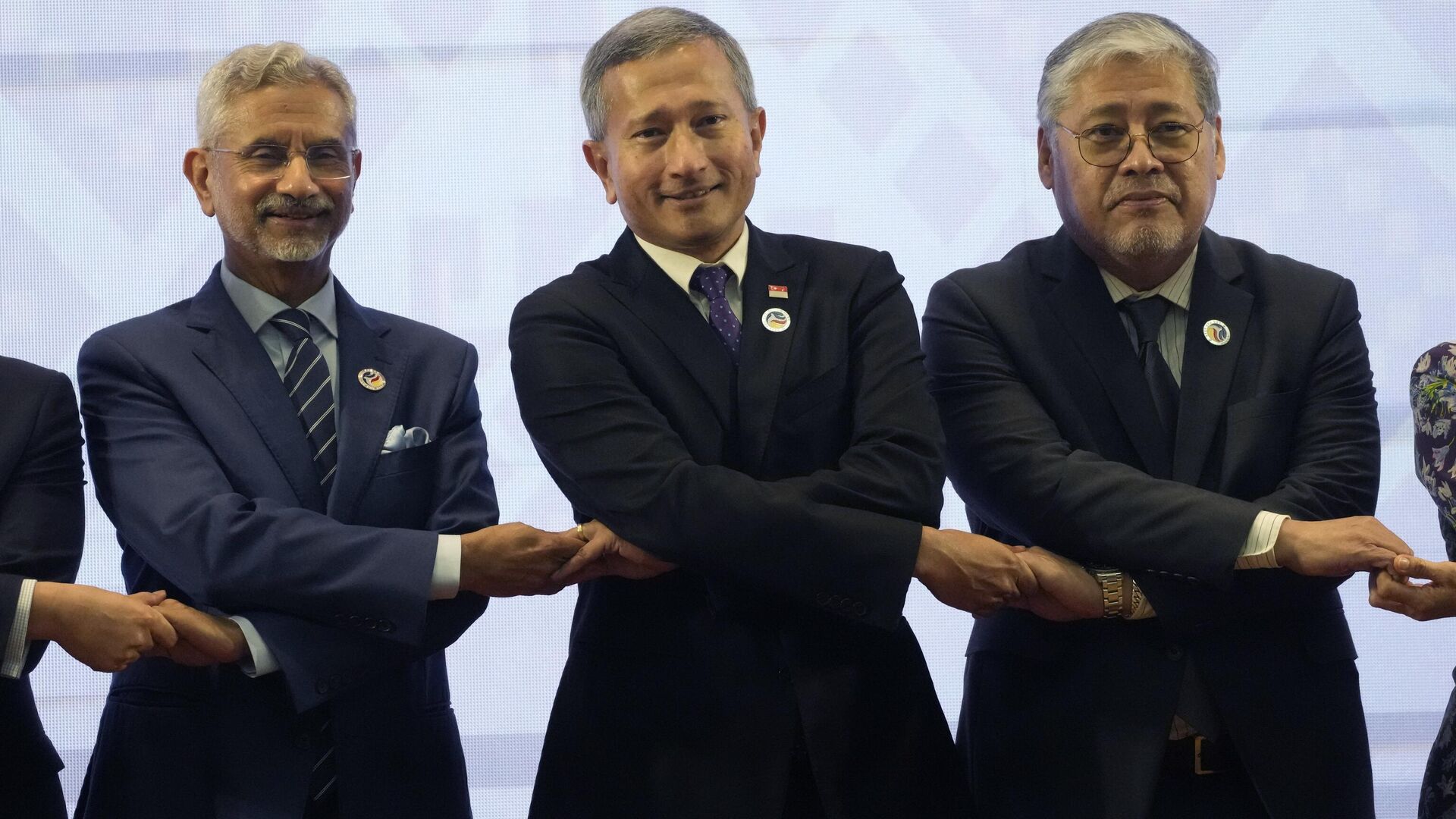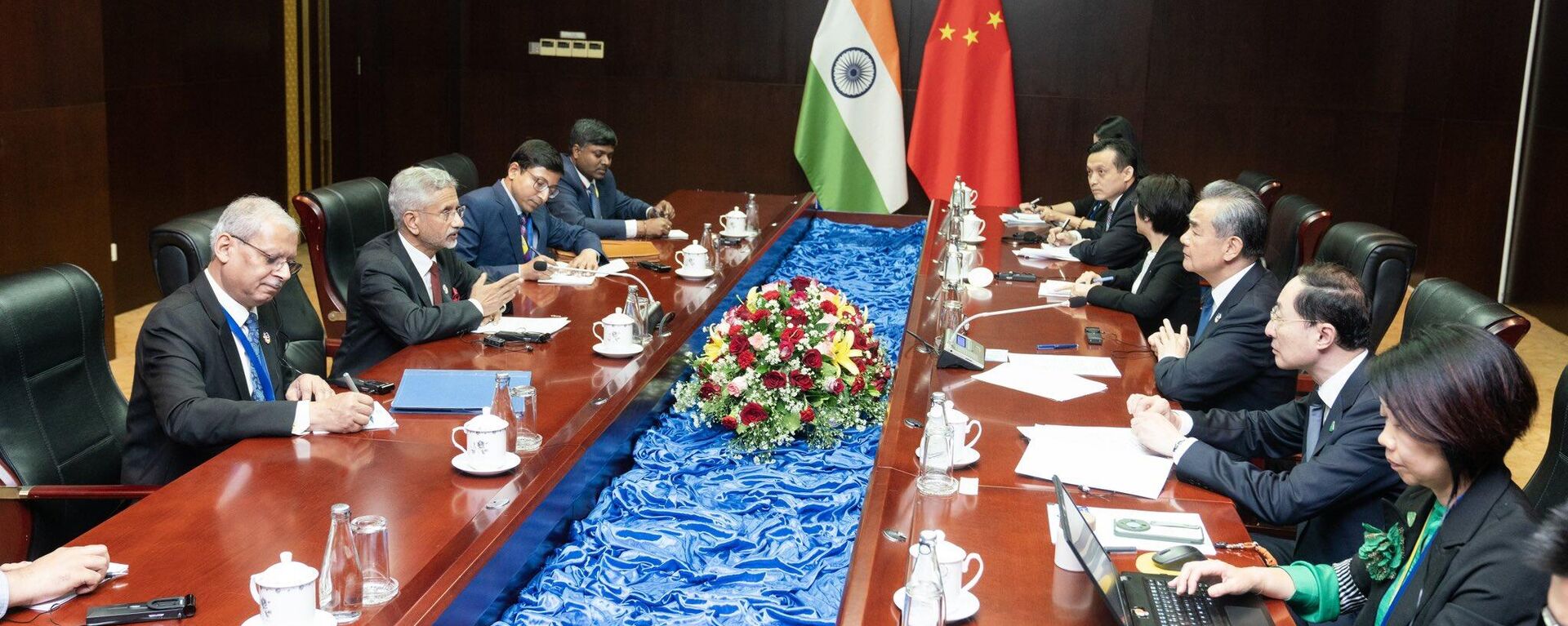https://sputniknews.in/20240726/indias-foreign-policy-looking-more-to-the-east-less-west-7918735.html
India's Foreign Policy: Looking More to the East, Less West
India's Foreign Policy: Looking More to the East, Less West
Sputnik India
There has definitely been a "paradigm shift" from the West to East in terms of India's economic and security orientation of India since the 1990s, according to an Indian think-tanker.
2024-07-26T19:12+0530
2024-07-26T19:12+0530
2024-07-26T19:12+0530
sputnik opinion
s. jaishankar
wang yi
narendra modi
china
asean
india
free trade agreement (fta)
ladakh
collective west
https://cdn1.img.sputniknews.in/img/07e8/07/1a/7920639_0:160:3072:1888_1920x0_80_0_0_033da70266854af81cb31205c8448e80.jpg
There has definitely been a "paradigm shift" from the West to East in terms of India's economic and security orientation since the 1990s, according to an Indian commentator.The shift started to happen in the 1990s at the end of the Cold War after India made economic reforms to liberalise its economy, Dr K Yhome, a Senior Fellow at Asian Confluence, a Shillong-based think tank focussed on Southeast and East Asian affairs, told Sputnik India.He stressed that expanding economic and security links with the 10-country Association of South Nations (ASEAN) and broader East Asian region have been the focus of Indian policymakers.Singapore, China and Russia have emerged as key export destinations for India since the 2000s, replacing its traditional destinations like the UK, Germany, Belgium, etc., the Indian Economic Survey 2023-24 released this week highlighted.New Delhi's decisions were also being driven by global factors, the pundit said, explaining this foreign policy re-orientation from a global perspective.The comments come against the backdrop of the India-ASEAN Foreign Ministers' Meeting in Vientiane on Friday.During his opening remarks at the meeting, Jaishankar described ties with ASEAN as the "cornerstone" of India's Act East Policy, a concept introduced by Prime Minister Narendra Modi at the ASEAN Summit in Naypyidaw in 2014.India's Act East Policy focuses on promoting economic, strategic and cultural cooperation with countries in the Indo-Pacific region through continuous engagement at bilateral, regional and multilateral levels, according to official documents.As part of that policy, New Delhi has been focussed on developing several key connectivity initiatives to connect its land-locked Northeast region to geographically contiguous and culturally similar southeast Asian region, including through projects such as Guwahati-Bangkok trilateral highway and the India-Myanmar Kaladan Multi-Modal Transit and Transport Project (KMMTTP).In terms of economic integration, New Delhi signed a free trade agreement (FTA) with ASEAN in 2003. India's trade with ASEAN stood at $122.67 billion in 2023-24, making the bloc one of India's biggest trading partners.''India Should Derive Benefits from China's Economic Rise'On the sidelines of the ASEAN-mechanism meeting in Laos, Jaishankar met Chinese Foreign Minister Wang Yi on Thursday evening.Both the delegates called for stabilising and rebuilding the ties which have been affected by the four-year-old Ladakh border standoff. Jaishankar and Wang also concurred that a stable Sino-India relationship would not only benefit both the countries, but also Asia and the world.Yhome suggested that there was a "growing realisation" among Indian policy-makers that New Delhi should accrue benefits from the economic rise of China, the world's second largest and Asia's biggest economy which is tipped to overtake the US in coming years."It would be a smart move. You can’t just cut off yourself from the benefits accruing from China’s rise and leave it to others to take advantage. As rightly pointed out in the Economic Survey 2023-24, India should seek the best of both East and West," the expert stated.China's strengths and dominance in certain sectors such as critical minerals and its potential role as an foreign direct investor (FDI) could help in bolstering the domestic manufacturing ecosystem and facilitate green transition, which would help in achieving the overall objective of becoming an export-driven developed economy by 2047, Yhome highlighted.Bilaterally, China ranked as India's biggest trading partner in the last fiscal year.However, there was a need to "strike a balance" as far as Sino-India economic ties are concerned, given the national security concerns in Indian establishment due to the ongoing Ladakh border standoff as well as Beijing's growing influence in the South Asian neighbourhood, Yhome cautioned."At the same time, India has to ensure that Beijing doesn’t become the only economic partner to the other countries in the region, which is why we are seeing an increasing thrust on connectivity, political and security engagements between India and ASEAN," the commentator said.India's economic involvement in South and Southeast Asia was critical to achieve its vision of having a "multipolar Asia", rather than ceding the entire space to Beijing, Yhome concluded.
https://sputniknews.in/20240726/india-china-seek-new-progress-on-ladakh-dispute-discuss-multipolarity-7915696.html
china
asean
india
ladakh
us
japan
global south
russia
bhutan
south asia
russia's far east
southeast asia
indo-pacific
Sputnik India
feedback.hindi@sputniknews.com
+74956456601
MIA „Rossiya Segodnya“
2024
Dhairya Maheshwari
https://cdn1.img.sputniknews.in/img/07e6/0c/13/138962_0:0:641:640_100x100_80_0_0_2cb44360dbcdf6d84bf4b299cd045917.jpg
Dhairya Maheshwari
https://cdn1.img.sputniknews.in/img/07e6/0c/13/138962_0:0:641:640_100x100_80_0_0_2cb44360dbcdf6d84bf4b299cd045917.jpg
News
en_IN
Sputnik India
feedback.hindi@sputniknews.com
+74956456601
MIA „Rossiya Segodnya“
Sputnik India
feedback.hindi@sputniknews.com
+74956456601
MIA „Rossiya Segodnya“
Dhairya Maheshwari
https://cdn1.img.sputniknews.in/img/07e6/0c/13/138962_0:0:641:640_100x100_80_0_0_2cb44360dbcdf6d84bf4b299cd045917.jpg
act east policy, india asean fta, india asean summit, asean meeting laos, modi act east policy, india china trade, india china dispute, ladakh dispute, ladakh standoff, chinese exports, chinese imports, bri, south asia, indo-pacific, indian economic survey, jaishankar wang yi talks, asean news, southeast asia news, indian exports, make in india
act east policy, india asean fta, india asean summit, asean meeting laos, modi act east policy, india china trade, india china dispute, ladakh dispute, ladakh standoff, chinese exports, chinese imports, bri, south asia, indo-pacific, indian economic survey, jaishankar wang yi talks, asean news, southeast asia news, indian exports, make in india
India's Foreign Policy: Looking More to the East, Less West
Even as New Delhi seeks investments and technologies from Western countries to bolster its manufacturing ecosystem, its foreign and security policy focus has increasingly shifted towards its eastern neighbourhood, including the Indo-Pacific.
There has definitely been a "paradigm shift" from the West to East in terms of India's economic and security orientation since the 1990s, according to an Indian commentator.
The shift started to happen in the 1990s at the end of the Cold War after India made economic reforms to liberalise its economy, Dr K Yhome, a Senior Fellow at Asian Confluence, a Shillong-based think tank focussed on Southeast and East Asian affairs, told Sputnik India.
He stressed that expanding economic and security links with the 10-country Association of South Nations (ASEAN) and broader East Asian region have been the focus of Indian policymakers.
Singapore, China and Russia have emerged as key export destinations for India since the 2000s, replacing its traditional destinations like the UK, Germany, Belgium, etc., the Indian Economic Survey 2023-24 released this week highlighted.
"In terms of security, our focus had largely been on Pakistan right from Independence till the late 1990s. Now, the focus has shifted towards the strategic challenge from China," Yhome said, adding that New Delhi has been expanding defence and strategic partnerships with "like-minded" partners such as southeast Asian states as well as Japan.
New Delhi's decisions were also being driven by global factors, the pundit said, explaining this foreign policy re-orientation from a global perspective.
"There are structural economic changes taking place in the world with the rise of Asia. Major Asian economies, which include India, China and Southeast Asian economies, are major drivers of global economic growth. It is only natural that India’s foreign policy considerations would be driven by the changing geoeconomic realities," Yhome concluded.
The comments come against the backdrop of the India-ASEAN Foreign Ministers' Meeting in Vientiane on Friday.
During his opening remarks at the meeting, Jaishankar described ties with ASEAN as the "cornerstone" of India's Act East Policy, a concept introduced by Prime Minister Narendra Modi at the ASEAN Summit in Naypyidaw in 2014.
"For us, political, economic and security cooperation with ASEAN is of the utmost priority. So too are people-to-people linkages, that we are constantly seeking to expand," Jaishankar told the India-ASEAN meeting in Laos.
India's Act East Policy focuses on promoting economic,
strategic and cultural cooperation with countries in the Indo-Pacific region through continuous engagement at bilateral, regional and multilateral levels, according to official documents.
As part of that policy, New Delhi has been focussed on developing several key connectivity initiatives to connect its land-locked Northeast region to geographically contiguous and culturally similar southeast Asian region, including through projects such as Guwahati-Bangkok trilateral highway and the India-Myanmar Kaladan Multi-Modal Transit and Transport Project (KMMTTP).
In terms of economic integration, New Delhi signed a free trade agreement (FTA) with ASEAN in 2003. India's trade with ASEAN stood at $122.67 billion in 2023-24, making the bloc one of India's biggest trading partners.
''India Should Derive Benefits from China's Economic Rise'
On the sidelines of the ASEAN-mechanism meeting in Laos, Jaishankar met Chinese Foreign Minister Wang Yi on Thursday evening.
Both the delegates called for stabilising and rebuilding the ties which have been affected by the four-year-old Ladakh border standoff. Jaishankar and Wang also concurred that a stable Sino-India relationship would not only benefit both the countries, but also Asia and the world.
Yhome suggested that there was a "growing realisation" among Indian policy-makers that New Delhi should accrue benefits from the economic rise of China, the world's second largest and Asia's biggest economy which is tipped to overtake the US in coming years.
"It would be a smart move. You can’t just cut off yourself from the benefits accruing from China’s rise and leave it to others to take advantage. As rightly pointed out in the Economic Survey 2023-24, India should seek the best of both East and West," the expert stated.
China's strengths and dominance in certain sectors such as critical minerals and its potential role as an foreign direct investor (FDI) could help in bolstering the domestic manufacturing ecosystem and facilitate green transition, which would help in achieving the overall objective of becoming an export-driven developed economy by 2047, Yhome highlighted.
Bilaterally, China ranked as India's biggest trading partner in the last fiscal year.
However, there was a need to "strike a balance" as far as Sino-India economic ties are concerned, given the national security concerns in Indian establishment due to the ongoing Ladakh border standoff as well as Beijing's growing influence in the South Asian neighbourhood, Yhome cautioned.
"At the same time, India has to ensure that Beijing doesn’t become the only economic partner to the other countries in the region, which is why we are seeing an increasing thrust on connectivity, political and security engagements between India and ASEAN," the commentator said.
India's economic involvement in South and Southeast Asia was critical to achieve its vision of having a "multipolar Asia", rather than ceding the entire space to Beijing, Yhome concluded.



